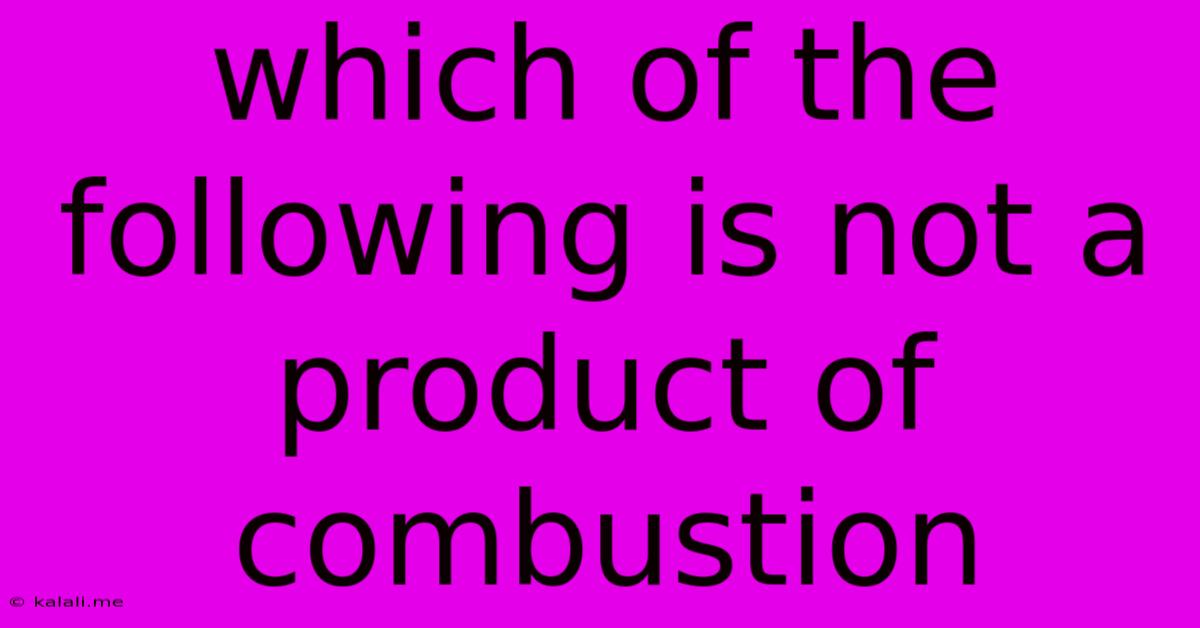Which Of The Following Is Not A Product Of Combustion
Kalali
Jun 13, 2025 · 2 min read

Table of Contents
Which of the Following is NOT a Product of Combustion?
Combustion, simply put, is a rapid chemical reaction between a substance and an oxidant, usually oxygen, that produces heat and light. Understanding the byproducts of this process is crucial in various fields, from engine design to environmental science. This article will delve into the typical products of combustion and identify which among a given set is not a result of this chemical process. We'll also explore the factors influencing the specific products formed.
The Usual Suspects: Common Products of Combustion
The most common products of complete combustion are carbon dioxide (CO2) and water (H2O). This occurs when there's sufficient oxygen to completely oxidize the fuel. For instance, the combustion of methane (CH4), the primary component of natural gas, follows this equation:
CH₄ + 2O₂ → CO₂ + 2H₂O
However, the reality is often more complex. Incomplete combustion, resulting from insufficient oxygen, leads to the formation of other compounds. These include:
- Carbon Monoxide (CO): A highly toxic gas, a byproduct of incomplete combustion. Its presence indicates a lack of sufficient oxygen during the burning process.
- Soot (Carbon Particles): Tiny particles of elemental carbon, formed when there's a significant deficiency of oxygen. Soot contributes to air pollution and has various health implications.
- Unburnt Hydrocarbons: These are fuel molecules that haven't been completely oxidized. Their presence is another indication of incomplete combustion.
- Nitrogen Oxides (NOx): Formed at high temperatures when nitrogen in the air reacts with oxygen. NOx gases are major air pollutants contributing to acid rain and smog.
Identifying the Non-Combustion Product: A Case Study
Let's consider a hypothetical scenario: Which of the following is NOT a product of combustion?
A. Carbon Dioxide (CO2) B. Water (H2O) C. Oxygen (O2) D. Carbon Monoxide (CO)
The correct answer is C. Oxygen (O2). Oxygen acts as a reactant (or oxidant) in the combustion process, not a product. It's consumed during the reaction, not created. While small amounts of oxygen might remain unreacted in a combustion process, it's fundamentally a reactant, not a direct byproduct.
Factors Affecting Combustion Products
The specific products of combustion depend on several factors:
- Fuel Type: Different fuels produce different combustion products. For example, burning wood produces ash and various organic compounds in addition to CO2 and H2O.
- Oxygen Availability: The amount of oxygen available dictates whether complete or incomplete combustion occurs. Insufficient oxygen leads to the formation of CO and soot.
- Temperature: Higher temperatures can favor the formation of NOx.
- Presence of other substances: The presence of other substances in the fuel or the surrounding environment can influence the types and amounts of products formed.
Understanding the products of combustion is essential for various applications, including designing efficient and clean-burning engines, developing strategies for pollution control, and assessing the environmental impact of various energy sources. By carefully controlling the parameters of the combustion process, we can minimize harmful byproducts and maximize energy efficiency.
Latest Posts
Latest Posts
-
The Study Of The Universe Is Called
Jun 14, 2025
-
Which Of The Following Is A Diagonal Matrix
Jun 14, 2025
-
What Is The Largest Source Of Freshwater On Earth
Jun 14, 2025
-
State With Highest Population In India
Jun 14, 2025
-
How Many Bits In A Hexadecimal Digit
Jun 14, 2025
Related Post
Thank you for visiting our website which covers about Which Of The Following Is Not A Product Of Combustion . We hope the information provided has been useful to you. Feel free to contact us if you have any questions or need further assistance. See you next time and don't miss to bookmark.